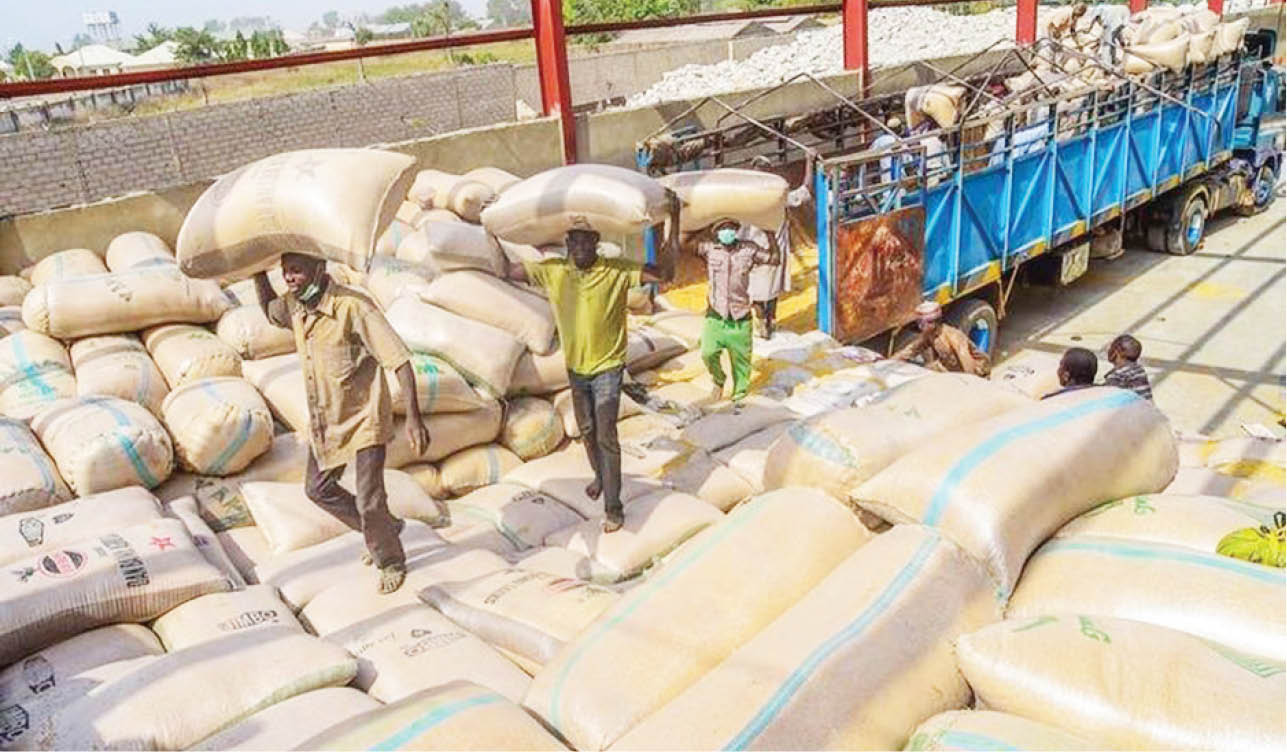How Kano is becoming Nigeria’s rice milling hub
With many rice mills springing up in Kano State, coupled with increase in production, the state is gradually becoming the hub of rice,

Workers offload rice paddy at a mill in Kano
With many rice mills springing up in Kano State, coupled with increase in production, the state is gradually becoming the hub of rice, not only in Nigeria but West Africa.
The recent rice farming activities in Kano have been seen as a record-breaking achievement in the history of Nigeria, as far as that sector is concerned.
As one of the staple foods in Nigeria, the consumption of rice is said to have increased to 4.7 per cent, almost four times the global consumption growth.
This triggered a revolution in the sector; hence the increase in rice milling in Kano.

From 2015 to 2020, no fewer than 230 micro, small, medium and large rice mills have emerged. A lot of the existing ones have also been upgrading their capacities.
In places like Kura, Gezawa, Bunkure, Garun Malam and Tudun Wada local government areas of the state, it is common to see a cluster of small-scale rice millers doing business.
New mega rice mills with thousands of metric tons per month capacity are also on the increase. The recent one has a 160-ton-per-day capacity. It is the first mega rice mill owned by a woman in Kano State.
In the past seven years, the Nigerian government, in collaboration with the Rice Farmers Association of Nigeria (RIFAN), boosted the production of rice by according it high priority. In 2017, production got to 3.7million tons.
It was reported that rice milling revolution in Kano started in 2014 when 70,000 farmers were mapped out to benefit from the year’s dry season farming programme in the state’s agricultural scheme. It was in conjunction with the then Federal Ministry of Agriculture’s Agricultural Transformation Agenda (ATA).
It is also believed that the achievement recorded in the production of rice in Kano is a result of various agricultural policies introduced by the Federal Government. For example, the Anchor Borrowers Programme (ABP), through various associations, as well as the ATA, encouraged many people to venture into agriculture, especially dry season rice farming. This resulted in an increase in the number of rice farmers in the state as demand increased.
With several efforts the Federal Government put in place through the ABP, the Central Bank of Nigeria (CBN) aggregator scheme, Nigeria Incentive-based Risk Sharing System for Agricultural Lending (NIRSAL), which is a $500million non-bank financial institution, wholly-owned by the CBN, among non-governmental interventions, in 2019, Nigeria moved from the status of the largest importer of rice to being the largest producer of rice (paddy) in Africa, with an average production volume of 8million metric tons.
It is also on record that as at 2019, Nigeria ranked as the first in Africa and the 14th largest producer of rice in the world, with China being the top producing country.
According to Iliyasu Nazifi, an engineer and young entrepreneur, in the last five years, rice production received the boost it had never received in the history of agriculture in Nigeria, which gave rise to the many milling factories in Kano State. Nazifi is the chief executive officer of the Golden Star Rice Mill and a member of the Rice Processors Association of Nigeria (RIPAN).
It was also said that this achievement wouldn’t have been possible without the commitment and support of members and leadership of the RIFAN across all the states in Nigeria.
According to the chairman of the RIFAN in Kano State, Alhaji Abubakar Haruna, Nigerians were initially estimated to have been consuming more than five million metric tons of rice each year, with a significant portion coming from imports.
He further revealed that demand, which was growing faster than supply, driven by factors like population growth and urbanisation, actually gave birth to the strategies adopted by the government to ensure increased production, which would lead to self-sufficiency.
“The development of rice value chain in Nigeria has immeasurably reduced urban-city migration and youth restiveness as many of the youths are gainfully engaged in agricultural practices,’’ Haruna said.
Also, the treasurer of the RIFAN in the state, Malam Hussaini Shu’aibu, revealed that the decision of the Federal Government to close Nigeria’s land borders against rice importation created a huge demand and created awareness for more domestic b mills.
It was also revealed that the state’s rice production capacity increased; hence the establishment of mills.
“Very soon, Kano State will move from being the centre of commerce to that of farming and processing,’’ Shu’aibu said.
However, the Kano State Chamber of Commerce, Industries, Mines and Agriculture (KACCIMA) is worried that the state has only recorded industrial boom in rice milling while other sectors suffer great setback.
According to the first deputy president of the KACCIMA, Ambassador Usman Darma, most industries in Kano are closed down due to electricity issues and financial challenges associated with policies of some commercial banks. He added that only few of the industries operate in full capacity.
“Virtually 85 per cent of industries in Kano are not working. The only expansion so far recorded is in rice mills, and that is because government policies have been favourable to the operators. However, with the recent visit by a combined team of the National Assembly and the Ministry of Industry, Trade and Investment, we are hopeful that the issue would be addressed in due course,’’ he said.
